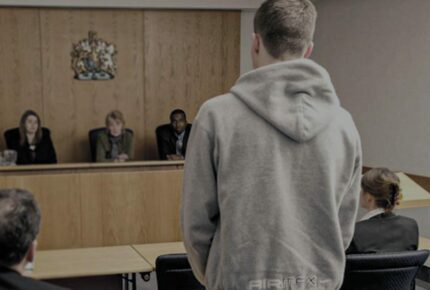

Safeguarding children from online predators is a critical responsibility carried by our legal system. When it comes to the offence of sexual communication with a child, the implications of a first time offence can be life-altering for both the victim and the offender. It is crucial to comprehend the gravity of engaging in such illicit conversations, as it can profoundly impact personal relationships and professional prospects. In this article, we delve into the legal intricacies surrounding first time offences involving sexual communication with a child. We explore the definition and implications of this crime, shed light on the nature of these conversations, and address common questions regarding sentencing and imprisonment for first time offenders.
What is the offence of sexual communication with a child?
The offence of “sexual communication with a child” refers to a criminal act in which an adult communicates with a child for the purpose of engaging in sexual activity or to encourage the child to participate in sexual activity. In the context of English law, this offence is primarily covered under Section 15A of the Sexual Offences Act 2003.
Key points the prosecution must prove include:
- Age of the Child: In the UK, the age of consent for sexual activity is 16. Anyone under this age is considered a child for legal purposes.
- Communication: The offence involves any form of communication, such as text messages, phone calls, online chat, or social media interactions, where the adult attempts to engage the child in sexual discussions or activities.
- Intent: To be charged with this offence, it must be proven that the adult’s intention was to communicate with the child for sexual purposes or to encourage the child to engage in sexual activity.
This law is in place to protect children from sexual exploitation and grooming by adults who may attempt to manipulate or coerce them into engaging in sexual activities. It is an essential part of safeguarding the well-being and safety of minors in England. As such, the offence of sexual communication with a child is a serious one, and those found guilty can face criminal penalties, including imprisonment, depending on the circumstances of the case.
What are some examples of sexual communication with a child?
Here are some examples:
- Explicit Text Messages: An adult sends sexually explicit text messages to a child, discussing sexual acts, desires, or fantasies with the intent to arouse the child or themselves.
- Social Media Messaging: An adult uses social media platforms to send sexual content or engage in sexually explicit conversations with a child.
- Online Chat Rooms: An adult enters online chat rooms or forums frequented by children and engages in discussions of a sexual nature with them.
- Webcam or Video Calls: An adult engages in video calls with a child, where the content of the interaction is sexual or involves the adult encouraging the child to perform sexual acts on camera.
- Sexting: An adult sends sexually explicit images or videos to a child, requests such content from a child, or encourages the child to send explicit images.
- Online Grooming: An adult befriends a child on social media or through other online platforms, gradually gaining their trust and then attempting to initiate sexual communication or meetings.
- Arranging Sexual Encounters: An adult uses online communication to arrange a meeting with a child for the purpose of engaging in sexual activity.
- Exposing Minors to Pornographic Material: An adult shares or exposes a child to explicit pornography or other sexually explicit material through digital means.
- Requests for Sexual Favours: An adult asks a child to engage in sexual acts or perform sexual favours via digital communication.
- Sending Sexual Gifts or Material: An adult sends sexually explicit gifts, materials, or objects to a child with the intent of engaging in sexual activity or grooming.
These are just some examples, and the specific actions that constitute the offence can vary.
What happens if you are suspected of committing sexual communication with a child in the UK?
If you are suspected of committing sexual communication with a child in the UK, it is a very serious matter, and you are likely to face legal consequences. Here is an overview of what can happen if you are suspected of this offence:
- Investigation: When a suspicion arises, the police will conduct an investigation into the allegations. This may involve gathering evidence, including digital communications, witness statements, and any other relevant information.
- Arrest: If there is sufficient evidence or reasonable grounds to suspect your involvement, the police may arrest you. You will be taken into custody for questioning.
- Questioning: While in custody, you may be questioned by the police about the alleged offence. You have the right to remain silent and the right to legal representation during questioning.
- Search and Seizure: The police may search your premises, electronic devices, and any other relevant property for evidence related to the alleged offence. They may seize digital devices for further examination.
- Bail, Investigation, or Detention: Depending on the circumstances, you may be released on bail, released under investigation, or held in custody pending further investigation. Conditions may be imposed to protect potential victims or prevent you from contacting the child involved.
- Charging Decision: After the investigation is complete, the police will forward the case to the Crown Prosecution Service (CPS) for a charging decision. The CPS will review the evidence and determine whether there is enough evidence to proceed with criminal charges.
- Court Proceedings: If charges are filed, you will be required to appear in court to face the allegations. You will have the opportunity to defend yourself, and legal representation is essential during this process.
- Possible Outcomes: If you are found guilty of sexual communication with a child, you may face penalties, including imprisonment, a fine, or a community order, depending on the severity of the offence and other factors.
- Criminal Record: A conviction for this offence will result in a criminal record, which can have long-lasting consequences, including difficulty finding employment, travel restrictions, and damage to your reputation.
Being suspected of a crime does not equate to guilt, and you have the right to a fair legal process. It is crucial to consult with a qualified solicitor or legal representative to understand your rights, receive legal advice, and ensure that your rights are protected throughout the legal proceedings. If you are questioned or arrested, you should exercise your right to remain silent and seek legal counsel immediately.
What is the sentence for sexual communication with a child in the UK?
The sentence for sexual communication with a child in the UK is governed by the Sexual Offences Act 2003. The maximum penalty for this offence is up to 2 years’ imprisonment.
Note that this is the maximum penalty, and the actual sentence imposed can vary based on factors.
The court takes into account both aggravating and mitigating factors when determining the appropriate sentence. Aggravating factors include elements such as a significant age disparity between the defendant and the child, a history of previous sexual offences, the use of grooming techniques, threats or coercion, and explicit content in the communication. These factors increase the severity of the offence. Conversely, mitigating factors can lead to a reduced sentence and may include an early guilty plea, genuine remorse and insight demonstrated by the defendant, a lack of previous convictions, cooperation with authorities, mental health or vulnerability issues, and misunderstandings regarding the child’s age or consent. The court carefully considers these factors to ensure that the punishment aligns with the unique circumstances of each case.
Will I go to prison if it is my first time committing sexual communication with a child?
Whether a first-time offender goes to prison can depend on several factors, including:
- The nature and severity of the communication: The content and intent of the communication will be examined, with more explicit or predatory communication generally leading to harsher sentences.
- The age of the child: The younger the child, the more likely a prison sentence may be considered, as younger age reflects particular vulnerability.
- Aggravating or mitigating factors: As mentioned previously, the presence of aggravating factors, such as grooming or coercion, can lead to a more severe sentence, while mitigating factors, such as remorse and cooperation, may lead to a more lenient sentence.
- Sentencing guidelines: Judges follow established sentencing guidelines that consider the above factors when determining an appropriate sentence.
While imprisonment is a possible outcome, the court may also consider alternatives such as community orders, probation, or other measures depending on the circumstances and the defendant’s individual case. Legal representation is crucial in such cases, as an experienced solicitor can advocate for the defendant and present relevant factors that may influence the sentencing decision.
Where to get further help
If you or someone you care about is facing charges or is already being prosecuted for the offence of sexual communications with a child, it is crucial you get expert advice as quickly as possible. The team at Stuart Miller Solicitors has decades of combined experience defending these cases and is standing by ready to assist. To get started, get in touch with our friendly non-judgemental team today.
OUR COMMITMENTS TO YOU:
-
Responsive
A legal expert will consult you within 24 hours of making an enquiry.
-
Empathetic
We will always treat you with trust, understanding and respect.
-
Specialised
Your case will be handled by an expert who specialises in your type of offence.
-
Proactive
We will take early action to end proceedings as soon as it is practically and legally possible to do so.
-
Engaged
You will be kept updated on your case at all times. We will provide a named contact available to answer your questions.
-
Caring
We understand this is a difficult and stressful time for you and your family. Our team will support you every step of the way.
-
Tenacious
We will never give up on your case. We fight tirelessly to get you the best possible outcome.

